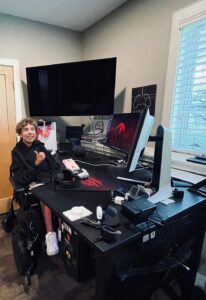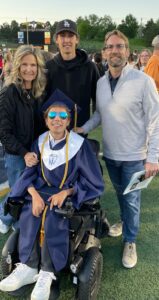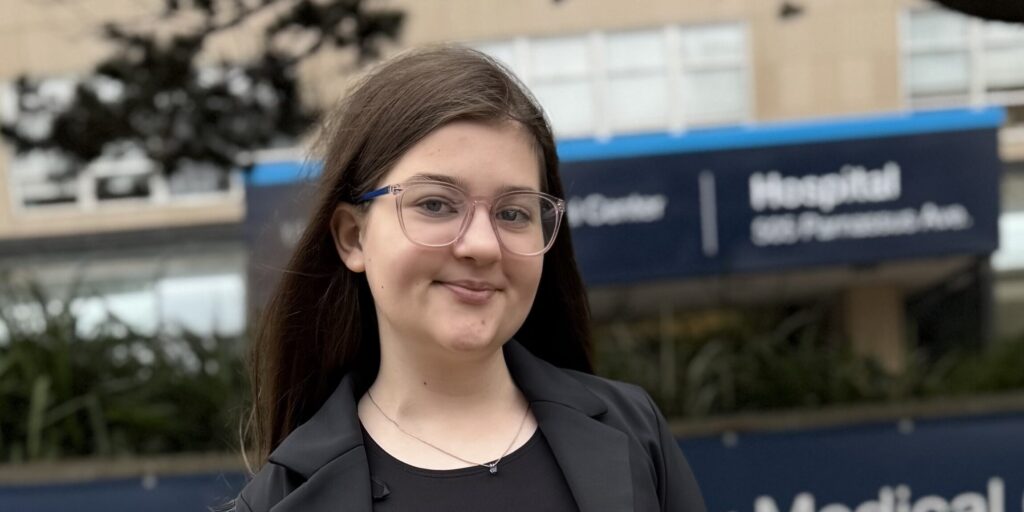
MDA Ambassador Guest Blog: How Technology Changed My Life – and Future
By Luke Hennessy | Monday, August 5, 2024
5 Second Summary
MDA Ambassadors play an essential role in furthering MDA’s mission while representing and empowering the neuromuscular disease community. Quest Ambassador Guest Blog series provides a platform to share their personal stories, perspectives, and experience.
Read more personal stories from members of the neuromuscular community about their College Experience as they share their journey, accomplishments, advice for accommodations and overcoming barriers, and insights into navigating college life with a disability.
Luke Hennessy lives in Prior Lake, Minnesota, and has SMA Type 2. He is studying Pre-Law with a major in Computer Information Systems and a minor in Political Science at Arizona State. Luke loves being outside and enjoys hanging out with friends in his free time.

Luke Hennessy
Growing up with a neuromuscular disease, my parents always offered unwavering support and acted as strong advocates for my inclusion. I was able to participate in various activities alongside my peers, and this foundation instilled in me the belief that I could achieve anything I set my mind to. From a young age, technology has been a constant companion for me, offering a world of possibilities when physical activities were not an option. Building my first computer at 12 years old and writing code in high school sparked a deep love for Computer Science, which has evolved into a desire to develop policies of data-driven solutions for people with disabilities. Discovering my passion for technology transformed my outlook. I learned how to program, mastered various OS software (a type of operating software that includes apple software and Windows based software), and was able to assist family members and friends with their technological challenges. When people asked, “What job will you have when you are older? Can you even work?” – it instilled a fear that I would never find employment. However, after turning sixteen, I secured my first job at Best Buy as a Geek Squad agent. As I reflect now on that first job and on my experiences, I recognize the importance of courage, bravery, and character in overcoming challenges and achieving my goals. Living with a muscle-degenerative disease has profoundly impacted me mentally, requiring immense strength and resilience.
In high school, since I couldn’t play sports, I joined the speech and debate team to find a competitive and fair activity. In my first year, I won many awards, made it to State Section Finals, and placed 5th in the competition. My journey of success continued as I became a board scholar in the 9th grade (an honor I carried all four years of high school), gained acceptance into the National Honor Society, mastered computer science, and lived a life like any other person. Technology opened my mind for realization and hope in my life, leading me to want to study Computer Science in college.

Luke Hennessy and his computer
I am now a student in the pre-law program at Arizona State University (ASU), and plan to study Computer Information Systems with a minor in Political Science. I will also be part of Barrett, The Honors College, an elite part of the ASU education system that determines acceptance based on GPA, volunteer hours, and a commitment to community service. This combination will enable me to develop expertise in artificial intelligence, which I aim to leverage in creating adaptive technologies for individuals with disabilities. A deep understanding of Computer Information Systems will provide the technical skills required to innovate, while Political Science will equip me with the knowledge to advocate for policies that promote inclusivity and accessibility. As a pre-law student with a passion for AI, I am particularly intrigued by how these two domains converge in the realm of patent law. AI is a driving force behind modern innovation, influencing various industries from healthcare to finance, and significantly impacting the development of assistive technologies for people with disabilities. I envision a future where robots assist with daily tasks like shopping, meal preparation, and transportation, fostering greater independence for those living with disabilities. I aspire to be a voice in research, addressing inequities within the realm of disability, and using my skills to bridge the gap between technology and accessibility. My primary reason for pursuing higher education is to empower people with disabilities to lead more independent lives. I aim to help individuals achieve comfort and happiness, free from fear or distress.

Luke Hennessy with family at his graduation
As I continue my journey at ASU and beyond, I hope to inspire others to recognize that true character is defined not by appearance or beliefs, but by one’s aspirations and actions. By studying Computer Information Systems at ASU and being part of Barrett, The Honors College, I will have access to unique resources and opportunities that will help me stand out when applying to law school. This experience will equip me with the knowledge and skills to advocate for policies and technologies that serve the needs of the disability community. My impactful actions in high school have prepared me for success at ASU, where I plan to make significant contributions both on campus and in my future career. Pursuing a degree in Computer Information Systems is not just a personal goal; it is my commitment to making a meaningful difference for people living with disabilities. I want to mentor others, showing them that it doesn’t matter how you look or if you have a disability; it’s how you approach your challenges in life.
Next Steps and Useful Resources
- For more information about the signs and symptoms of Spinal Muscular Atrophy (SMA), as well an overview of diagnosis and treatment concerns, an in-depth review can be found here.
- To learn more about MDA’s Young Adult Programs, visit here.
- MDA’s Resource Center provides support, guidance, and resources for patients and families. Contact the MDA Resource Center at 1-833-ASK-MDA1 or ResourceCenter@mdausa.org
- Stay up-to-date on Quest content! Subscribe to Quest Magazine and Newsletter.
Disclaimer: No content on this site should ever be used as a substitute for direct medical advice from your doctor or other qualified clinician.




